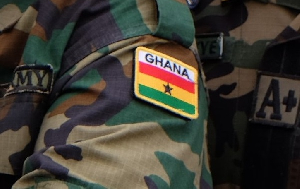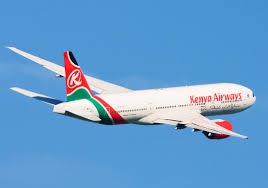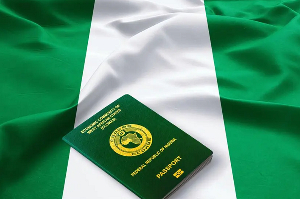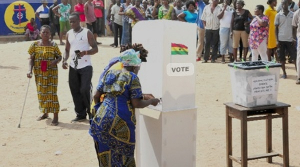- Home - Sports
- Soccer Portal
- Archived Sports News
- Sports Videos | TV
- Year In Review
- Sports Photos
- Sports Headlines
- Boxing
- Athletics
- Basketball
- Bodybuilding
- Cricket
- Golf
- Handball
- Hockey
- Martial Arts
- Tennis
- Volleyball
- Other Sports

General News of Monday, 14 April 2003
Source: Ghanaian Chronicle
The untold story of Kwesi Pratt's "betrayal"
It is several days now since WOI (Rtd) Adjei Boadi, member of the erstwhile Provisional National Defence Council (PNDC), shocked many when he told the National Reconciliation Commission (NRC) that it was Kwesi Pratt, managing editor of The Insight, who caused the arrest and detention of his long time friend, Kweku Baako, editor-in-chief of The Crusading Guide, during the early days of the PNDC rule.
Mr Pratt, since then, has had a field day on the local airwaves and in his own newspaper, hitting back at his accuser and feverishly fighting to parry the damning blow. However, The Ghanaian Chronicle findings indicate that two other names that had come as potential victims in relation to Pratt’s ‘grassing’ are Messrs Kwasi A. Agbley and Freddie Blay, who were both arrested with Kweku Baako at the time.
First hint of this revelation came when Kofi Coomson called Pratt a ‘traitor’ and reminded him that he knew of his treachery against the three gentlemen who were very good mutual friends of theirs. This was after an off air confrontation at Vibe FM studios in 2001, when Pratt unleashed one of his now familiar savage attacks on Dr Paa Kwesi Nduom during his vetting.
Sources close to Vibe FM told the Chronicle that in early 2001, days after the NPP had come to power, Kofi Coomson and Kwesi Pratt engaged in a ferocious debate on radio over Dr Kwesi Nduom. The debate later turned nasty off air when Coomson challenged Kwesi, calling him a traitor and revealed that he knew that he grassed on Kweku Baako, Kwasi Agbley and Freddie Blay, all three very close personal friends of both Kofi Coomson and Pratt.
Coomson also wondered why Pratt was always attacking successful people, including even him, though he set up his paper The Insight for him free of charge. Pratt was stunned and quickly recoiled, according to former Vibe FM sources, but it appeared the two men patched up afterwards, because they entered the lift together and left for their various destinations.
Since the stunning revelation by the former PNDC hatchet man, WOI Adjei Boadi, at the ongoing NRC sittings, that Kwesi Pratt operated as a double agent who caused the arrest of his friend, Kweku Baako, and but for his timely intervention, Kweku Baako would have summarily been executed, the question of the credibility of the named parties involved has agitated the minds of many observers of the unfolding drama.
A Chronicle trip to the latter days of the erstwhile Armed Forces Revolutionary Council (AFRC) unearthed that two factions emerged in the council, one of which was spearheaded by Captain Kojo Boakye Djan, a pro-constitution group which wanted the then planned handing over to an elected government to proceed.
The other, an anti-democracy group, led by the fiery Jerry Rawlings, was in no mood to return power to the victorious People’s National Party (PNP), led by the late Dr Hilla Limann. The rift among the AFRC members affected their civilian counterparts, among which were Kweku Baako, Kwesi Pratt, Yaw Adu Larbi, Kwasi Agbley, Stanley Armattoe, Dr Kwesi Jonah and Nat Ayivor, who went along with Boakye Djan. It was this group that became the Movement on National Affairs (MONAS).
For this group, the purpose of the June ’79 Uprising was primarily twofold- to free Jerry Walings from impending death, and to put an end to military interventions in civilian rule. An executive member and spokesperson for the erstwhile MONAS leadership, Kwas A. Agbley, who spoke to the Chronicle last week, explained that the rift remained unhealed up to the time circumstances forced the then skinny Jerry Rawlings to reluctantly hand over power to President Liman.
He cited Rawlings’ warning to the late Dr Limann at the handing over ceremony that the elected leader was on probation to contend that the June 4 group had a deliberate, calculated subversive intent, which unfortunately many Ghanaians did not take seriously. “Soon after the handover, when we realised that Jerry Rawlings and his group were making clandestine moves to bring back military rule, we began to make counter moves to thwart their plans,” the MONAS executive member told the paper, adding that the subversionist group, however, as everyone knows, eventually succeeded in toppling the People’s National Party (PNP) government on 31 December 1981.
When asked to comment on the allegations against Kwesi Pratt made by Adjei Boadi at the NRC, the MONAS executive said it was largely a correct representation of events leading to, and surrounding the arrest and near execution of the MONAS leadership, and so would not doubt Adjei Boadi, adding however that he would not accept Adjei Boadi’s assertion that he saved Kweku Baako from being summarily executed. “He probably saved us from subsequent execution,” Agbley opined.
Agbley said it is not true that Kwesi Pratt was arrested 14 times. He challenged Pratt to “come out clean and tell the world the true circumstances surrounding his alleged arrest in January 1982. “He should be brave and honest and tell Ghanaians where and when he was first ‘arrested,’ by whom, for what reason and under what circumstances,” the spokesman challenged.
He added, “He should also list and tell us which guardroom, police station or wherever he was kept, by who and for how long.” “You’ve forced me to talk about this. We had forgiven him, but instead of keeping quiet, my friend Kwesi has been hopping from one radio station to the other, denying his links to the PNDC. If I were him, I would keep quiet. He is rather tightening the rope around his neck.
Speaking on behalf of the defunct MONAS executive members, he indicated that sooner or later the whole world would know whether Kwesi Pratt voluntarily gave himself up, or was arrested and whether he was an informant of the notorious PNDC or not.
Agbley wondered why Kwesi Pratt was the only person in the movement’s leadership to be picked up and detained for a month and released a day before he, Agbley, and the others were picked up from various homes. “Why weren’t we all grabbed?” he asked rhetorically.
He explained that it was true that in the heady days of the so-called 31 December revolution, the leadership of the MONAS were arrested, detained and were to have been summarily executed in the night of the day they were picked up. “How we escaped death that night only we can tell, nobody else,” he said confidently.
According to him, however, Kwesi Pratt was “allegedly arrested” on 4 January 1982 and it was only a day after he was “allegedly released”, early February, the same year, that he and the rest of the MONAS leadership were picked up, one by one, and detained in the guardroom before subsequently being transferred to prison where they spent varying periods ranging from nine to 30 months.
Agbley served 22 months, while Kweku Baako served 30 months, including a re-arrest after an initial spell of 24 months, Chronicle was told.
When drawn back to the alleged role of Kwasi Pratt in their being picked up, the MONAS executive member reiterated, “Go and ask Kwesi Pratt where he was arrested, by whom, and with what he was charged. I said the man was ‘released’ the day before we were being herded into the guardroom.”
He challenged Pratt to boldly and cleanly come to the public domain to tell the masses all the various prisons and police stations where he claimed he was arrested fourteen times, ‘for the documents and facts need to be cross-checked. He was not arrested fourteen times as he claims, he was only throwing dust into our eyes. Kwesi had created the impression, until Adjei Boadi’s exposure, that he was arrested with Kweku Baako, and the rest of the MONAS leadership. He had been confusing the facts.”
Asked what caused their arrests on 4 February 1982, he said, “We were arrested in our various homes on the basis that the MONAS, as a group, mounted resistance against the coup d’etat led by Jerry Rawlings, to restore the constitutional order, which he had thrown out of order on 31 December 1981.”
When the paper contacted Freddie Blay last Thursday, he admitted that there is a lot to say about the matter, but he would wait for Kwesi Pratt to exhaust his spin over the allegations against him by WOI Adjei Boadi. There are the other members of the defunct MONAS who at the right time will come out with the facts, he added.
The Ghanaian Chronicle learnt that Kweku Baako was picked up in Takoradi from the residence of Freddie Blay, who had earlier at dawn been arrested at his Nima residence in Accra by a platoon of soldiers, armed to the teeth, and later taken to Takoradi.
Chronicle’s London sources have intimated that in the last few days, Pratt had been in contact with his London colleagues to court support in his battle to disentangle himself from Adjei Boadi’s damning disclosure. In an interview he granted to The Statesman and published on Friday 4 April, this year, Pratt revealed that there was indeed some tension between himself and the other members of MONAS in the days leading to the arrest of the movement’s leadership.
The paper quotes him saying, “At that time, there were difficulties between myself and Kweku Baako and the others in the organisation.” However, according to the paper, Pratt vehemently denied ever working with the PNDC, let alone being close to its chairman, the then skinny Jerry Rawlings.










